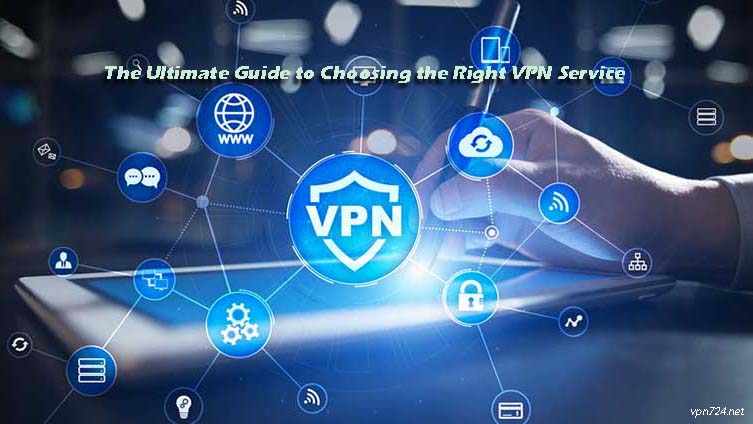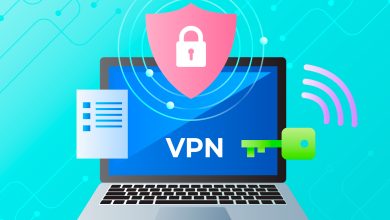The Ultimate Guide to Choosing the Right VPN Service

In today’s connected world, online privacy and security have become key concerns. With the increasing number of cyber threats and data breaches, it is essential to protect your online activities. One powerful tool that can help protect your digital life is a virtual private network (VPN). However, with so many VPN services available, it can be difficult to choose the right one. In this comprehensive guide, we’ll explain the key factors you should consider when choosing the right VPN service for your needs.
Purpose of using a VPN
Before you dive into the world of VPNs, you should consider why you need a VPN. VPNs serve several purposes, such as:
Privacy: if your primary concern is to protect your online privacy and ensure anonymity, you should look for VPNs that have a strict no-logs policy.
Security: if you want to protect your data when using public Wi-Fi or accessing sensitive information, opt for a VPN with robust encryption protocols.
Access to geographically restricted content: To bypass geographic locks and access content from around the world, choose a VPN with a wide range of server locations.
Understanding your purpose will help you narrow down your options and find a VPN that meets your specific needs.
Logging policy
A VPN’s logging policy is an important factor to consider. A no-logging policy means that the VPN provider does not keep a record of your online activities, so your privacy remains untouched. Look for VPNs with transparent and independently audited logging policies to make sure they stick to their claims.
Security features
The security features offered by a VPN are critical to protecting your data. The most important security features you should look out for are:
Encryption: make sure the VPN uses strong encryption methods like AES 256-bit encryption to protect your data from being intercepted.
Kill switch function: a kill switch automatically disconnects the Internet connection when the VPN connection drops, preventing your data from being exposed.
DNS Leak Protection: This feature ensures that your DNS queries remain encrypted and prevents your ISP from monitoring your online activity.
Split Tunneling: Split tunneling lets you choose which traffic goes through the VPN and which goes directly to the Internet, providing flexibility and speed.
Protocol options: VPNs offer several protocols, such as OpenVPN, L2TP/IPsec, and IKEv2/IPsec. Choose a protocol that balances security and speed according to your needs.
Server locations
The number and location of VPN servers is critical, especially if you want to access geographically restricted content or maintain fast connection speeds. Look for a VPN provider with a large server network spread across different countries and regions to ensure you have options for secure and fast connections.
Speed and performance
When using a VPN, your internet speed may be slightly reduced due to the encryption and routing through the servers. To minimize this, choose a VPN that is known for its high speed. You can also test different VPNs with free trials or money-back guarantees to find out which one is best for your specific needs.
Compatibility
Make sure that the VPN service you choose is compatible with the devices and platforms you use. Most VPNs support Windows, macOS, Android, and iOS, but if you have specific requirements, you should check compatibility before signing up.
Usability
A user-friendly interface can greatly improve your VPN experience. Look for VPNs that offer easy setup and user-friendly apps. Also, customer support and documentation should be readily available in case you run into problems.
Price and payment options
VPN prices vary, so it’s important to find a service that fits your budget. Most VPNs offer monthly, annual, or even multi-year subscription plans. Be on the lookout for discounts, special offers, and money-back guarantees. Be wary of free VPNs as they can compromise your privacy or security.
Customer support and reputation
A VPN provider’s reputation and customer support are indicators of its reliability. Read user reviews and get recommendations from trusted sources to assess a VPN’s reputation. Also, test the responsiveness and helpfulness of the customer support team to make sure you can get assistance when needed.
Additional features
Some VPNs offer additional features, such as ad blockers, malware protection, and the ability to connect multiple devices at once. These extras can improve your overall online experience and add value.
Choosing the right VPN service is a crucial step in ensuring your online privacy, security, and access to unrestricted content. By considering factors such as intended use, logging policies, security features, server locations, speed, compatibility, ease of use, price, customer support, and additional features, you can make an informed decision that meets your specific needs and preferences. Remember that not all VPNs are the same, so take the time to research and test different options to find the one that suits you best. In a time when online threats are omnipresent, investing in a reputable VPN service is a proactive step towards a safer and more secure digital future.



